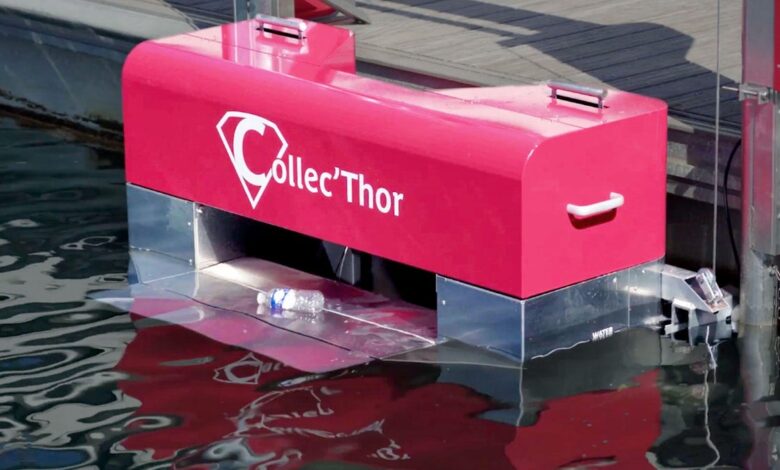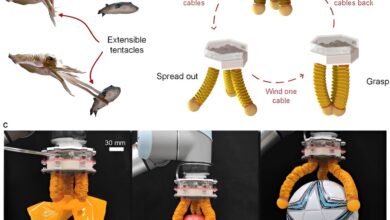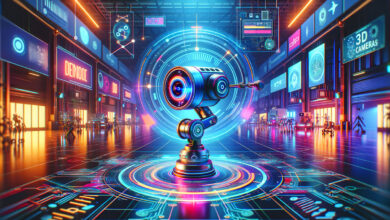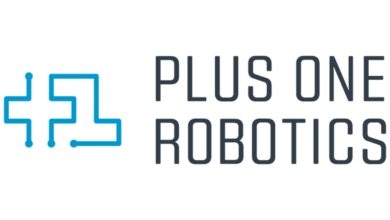Trash Gobbling Robots Cleaning Lake Tahoe and Beyond! – Video

Speaker 1: From the beach to the water itself. Machines are helping remove plastic, pollutants and invasive species. We got up close and personal with these trashy robots to learn about how they work and how they fight pollution beyond just cleaning. Let’s get into it. We begin with Bebot, the fully electric, solar powered beach cleaning robot made by the cereal cleaners. We covered Bebot a few years ago and finally got to meet it in person at EcoClean Solutions in Lake Tahoe.
Speaker 2: I found [00:00:30] out about the Bebot through a video the CNET actually did about three years ago.
Speaker 1: Bebot works like a sand sifter propelled by tracked treads. As bebot moves along the sand, sifter dips down into the sand, a few inches scooping up sand as it goes. The sand is brought over the sifter, which shakes back and forth, releasing the sand and holding onto any bits of debris stored inside it. The debris then gets emptied out and examined.
Speaker 3: Human power comes back into the fold and we actually sort [00:01:00] and remove trash, inorganic debris, and anything organic or natural to the environment gets redistributed into the sand.
Speaker 1: Bebot is operated by a remote control that looks something like a video game controller.
Speaker 2: I joke with my fiance that I’ve been training my whole life for this by playing video games.
Speaker 1: Pixie Drone is another electric trash eating machine made by the cereal cleaners that’s found work at Lake Tahoe. This version is remote controlled like Bebot, though the company [00:01:30] makes an autonomous version as well like a Roomba for the water that can be operated at night while boats are docked.
Speaker 3: What it kind of looks like is essentially like a baline whale in which it has an open mouth. It skims the surface, and then it has a mesh collection reservoir, and so as it moves through the water, what it’s doing is it’s bringing material into the mouth of the pixie drone, and then it hits that mesh and the water flows out through the backside, but then any material that’s caught up in the pixie drone is then collected.
Speaker 1: [00:02:00] The pixie drone was initially designed to filter trash or with the addition of a hydrocarbon filter, it could be added to remove contaminants like oil from the surface. However, the folks at EcoClean Solutions found another use for
Speaker 3: It, the warming of the climate. It creates this really good stew to grow aquatic invasive weeds, and it’s been the single biggest issue in the Lake Tahoe basin for the overall health of the lake.
Speaker 2: It just takes a little fragment the size of my thumbnail, and that can start a whole new patch.
Speaker 1: Just like with [00:02:30] the debris gathered by Bebot, everything gathered by pixie drone is sorted by humans to ensure that the materials collected are handled properly. The serial cleaners also make a stationary collection device called the Collector. It attaches to docks or floating structures can be plugged into the Standard Shore power system. Most docks use for electricity and gather surface waste 24 7.
Speaker 3: The benefit of the collector and even the pixie drone is you can actually install hydrocarbon sponges in it, so only is it capturing [00:03:00] inorganic debris and material, but it can also capture hydrocarbons, things like surfacing oil and gasoline to really purify the waters.
Speaker 1: It pumps through 32,000 liters of water every hour can store over 200 pounds of waste at a time. An EcoClean solution says they’re bringing one to Lake Tahoe.
Speaker 3: It doesn’t create enough suction where if you’re a duck, you’re going to get sucked in or anything like that.
Speaker 1: Since the collector is not mobile, the way that Bebot and pixie drone are, the waste needs to come to it. This [00:03:30] can be accomplished by placing collector in areas where waste tends to accumulate naturally, or by utilizing the fourth final and perhaps most unique offering In the serial cleaners lineup Beat Invis Bubble, this curtain of bubbles is made by pipes filled with small holes and connected to an air compressor. Blowing air through the pipes unleashes millions of bubbles creating two types of movement, a gentle upward movement from the rising bubbles, as well as the movement at the surface outward where the bubbles break through. These forces together are what allow Invis [00:04:00] bubble to block debris from target areas while guiding it into collection points where something like a collector or a pixie drone can finish the job and remove it from the environment. Collector costs about $25,000, including delivery and installation. The remote controlled pixie drone is under 40,000 while the autonomous version is closer to 60,000. The cost of Envizi bubble varies more depending on the specific project, how many lines of bubble curtain are being installed and things like that, but it can be anywhere between 50,000 and $150,000. [00:04:30] The target customers for these machines are things like nonprofits, hotels, and marinas that have an interest in keeping the waterways clean,
Speaker 4: And that’s why I’m telling to the marina industry, to the hospitality industry. Don’t always wait for the government to take strong actions against the problem because you can do it to yourself
Speaker 1: Together. Tools like Bebot, pixie Drone Collector and Envizi Bubble can help remove trash, pollutants and invasive species after they’ve [00:05:00] arrived. The larger goal is to prevent trash from showing up in these beautiful places in the first place, and the serial cleaners technology may be able to help with that too. Operating these machines in public can start conversations with visitors about environmental pollution and the struggle against it. Gathering trash also means gathering data about what type of trash is most commonly showing up in a given area. By tracing that trash back to its source, it can be used to inform advocates and policymakers about where to focus [00:05:30] their efforts to be most effective
Speaker 3: By approaching them from a data perspective and say, this isn’t in your landfill, it’s not in the recycling, it’s in your beach, so what are you going to do about it? That they take those real courageous approaches to do things like plastic water, bottle bans, policy implementation, and things along those lines.
Speaker 1: That information could also be used to pressure the companies producing the trash to change their practices or start paying to up the mess that they’re profiting from creating.
Speaker 3: In a perfect [00:06:00] world, we put ourselves out of business.
Speaker 1: Such a world still looks to be a long way off. According to a 2023 report on plastic makers from Minderoo Foundation, more single use plastic is being produced than ever before.
Speaker 4: It’s so important to give this message that the technology is not going to fix the problem. Only humanity by changing consumption habits can fix that problem.
Speaker 1: As always, thanks so much for watching with the fan. I’m your host, Jesse Yal. See you next time.
Speaker 5: I.



